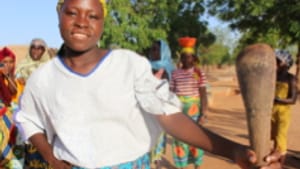Stay in the Loop
BSR publishes on a weekly schedule, with an email newsletter every Wednesday and Thursday morning. There’s no paywall, and subscribing is always free.
Can one journalist make a difference? Ask the young mothers of West Africa
My favorite journalist: Nicholas Kristof

The world is such an unmitigated mess that my heart surges every time I see Nicholas Kristof's byline in the New York Times, especially during his annual award to an aspiring American journalist to accompany him abroad.
The lucky student winner this year is Erin Luhmann of the University of Wisconsin; their goal this year is Danja, Niger, West Africa, where, as Kristof describes, young women "straggle in by foot, donkey cart or bus: humiliated women and girls with their heads downcast, feeling ashamed and cursed, trailing stink and urine." (Click here.)
Married off at 12 or 13, these adolescents become pregnant before their malnourished bodies are ready. In childbirth they have suffered a devastating obstetric injury that has left them "incontinent, leaking urine and sometimes feces through their vaginas. Most have been sent away by their husbands, and many have endured years of mockery and ostracism as well as painful sores on their legs from the steady trickle of urine."
Marriage before menstruation
They had heard of the daily medical miracles performed at the Danja Fistula Center in Niger, West Africa. Kristof speaks proudly of an earlier report of his that moved hundreds of Times readers to donate more than $500,000 to the Worldwide Fistula Fund so that two idealistic doctors could open their hospital.
This year the clinic's first patient was Hadiza Soulaye, who had never been to school and didn't know her own birth date. Her family married her off at 11 or 12, before she began to menstruate. Hadiza was not consulted but became her own uncle's second wife.
Within a year she was pregnant. Hadiza had no prenatal care, and a traditional birth attendant couldn't help when she endured three days of obstructed labor. By the time she was taken to a hospital for a Caesarean delivery, her baby was dead and she had suffered internal injuries, including a hole, or fistula, between her bladder and vagina.
Hadiza didn't know what had happened. "I just knew I couldn't control my pee," she told Kristof, "and I started crying."
Return to the village
Everybody shunned her. Her husband threw her out of "his" house; other villagers considered Hadiza so unclean that they wouldn't let her fetch water or prepare food. Her dress was constantly wet with urine, and everybody mocked her.
Hadiza suffered several years of this abandonment. (She didn't realize she had joined a despairing world crowd of 2 million fistula sufferers.)
When she heard of the Danja Fistula Center, Hadiza wondered if it could help her. Dr. Steve Arrowsmith, a urologist from Michigan who had helped plan the center— and healed more fistulas than any other Americans— operated on Hadiza and repaired the damage. He warned her not to have sex for six months so that the surgery could heal. Hadiza returned to her village, thrilled to be healed.
Alas, her husband ordered her to his bed. He tore open the fistula. She began leaking again. Her husband threw her out of the house again, and she vowed never to return.
"'City of joy'
The Danja Fistula Center is conducting research to see how best to repair women like Hadiza. If they halve the operating process, they double the number of women they can repair. Dr. Arrowsmith and Dr. Lewis Wall, an obstetrics professor from Washington University in St. Louis, are partners with Serving in Mission, an American Christian charity with long experience in Danja. But they want the Africans to be in charge, so Dr. Arrowsmith is training Dr. Itengre' Ouedraogo to take over.
Kristof concludes on an upbeat note: "This fistula center continues to exist on a shoestring, struggling for operating funds. But the exuberance of the patients is contagious, and I wanted readers to know that your generosity has built a city of joy…. These women may arrive miserable and shamed, but they leave proud, heads held high. And in a complicated world of trouble, that's a reason to celebrate."
Reason also, I would add, to celebrate a journalist who ventures far from his comfy homeland to demonstrate that ordinary individuals can still make a big difference in the world.♦
To read a related comment by Dan Rottenberg, click here.
The lucky student winner this year is Erin Luhmann of the University of Wisconsin; their goal this year is Danja, Niger, West Africa, where, as Kristof describes, young women "straggle in by foot, donkey cart or bus: humiliated women and girls with their heads downcast, feeling ashamed and cursed, trailing stink and urine." (Click here.)
Married off at 12 or 13, these adolescents become pregnant before their malnourished bodies are ready. In childbirth they have suffered a devastating obstetric injury that has left them "incontinent, leaking urine and sometimes feces through their vaginas. Most have been sent away by their husbands, and many have endured years of mockery and ostracism as well as painful sores on their legs from the steady trickle of urine."
Marriage before menstruation
They had heard of the daily medical miracles performed at the Danja Fistula Center in Niger, West Africa. Kristof speaks proudly of an earlier report of his that moved hundreds of Times readers to donate more than $500,000 to the Worldwide Fistula Fund so that two idealistic doctors could open their hospital.
This year the clinic's first patient was Hadiza Soulaye, who had never been to school and didn't know her own birth date. Her family married her off at 11 or 12, before she began to menstruate. Hadiza was not consulted but became her own uncle's second wife.
Within a year she was pregnant. Hadiza had no prenatal care, and a traditional birth attendant couldn't help when she endured three days of obstructed labor. By the time she was taken to a hospital for a Caesarean delivery, her baby was dead and she had suffered internal injuries, including a hole, or fistula, between her bladder and vagina.
Hadiza didn't know what had happened. "I just knew I couldn't control my pee," she told Kristof, "and I started crying."
Return to the village
Everybody shunned her. Her husband threw her out of "his" house; other villagers considered Hadiza so unclean that they wouldn't let her fetch water or prepare food. Her dress was constantly wet with urine, and everybody mocked her.
Hadiza suffered several years of this abandonment. (She didn't realize she had joined a despairing world crowd of 2 million fistula sufferers.)
When she heard of the Danja Fistula Center, Hadiza wondered if it could help her. Dr. Steve Arrowsmith, a urologist from Michigan who had helped plan the center— and healed more fistulas than any other Americans— operated on Hadiza and repaired the damage. He warned her not to have sex for six months so that the surgery could heal. Hadiza returned to her village, thrilled to be healed.
Alas, her husband ordered her to his bed. He tore open the fistula. She began leaking again. Her husband threw her out of the house again, and she vowed never to return.
"'City of joy'
The Danja Fistula Center is conducting research to see how best to repair women like Hadiza. If they halve the operating process, they double the number of women they can repair. Dr. Arrowsmith and Dr. Lewis Wall, an obstetrics professor from Washington University in St. Louis, are partners with Serving in Mission, an American Christian charity with long experience in Danja. But they want the Africans to be in charge, so Dr. Arrowsmith is training Dr. Itengre' Ouedraogo to take over.
Kristof concludes on an upbeat note: "This fistula center continues to exist on a shoestring, struggling for operating funds. But the exuberance of the patients is contagious, and I wanted readers to know that your generosity has built a city of joy…. These women may arrive miserable and shamed, but they leave proud, heads held high. And in a complicated world of trouble, that's a reason to celebrate."
Reason also, I would add, to celebrate a journalist who ventures far from his comfy homeland to demonstrate that ordinary individuals can still make a big difference in the world.♦
To read a related comment by Dan Rottenberg, click here.
Sign up for our newsletter
All of the week's new articles, all in one place. Sign up for the free weekly BSR newsletters, and don't miss a conversation.

 Patrick D. Hazard
Patrick D. Hazard